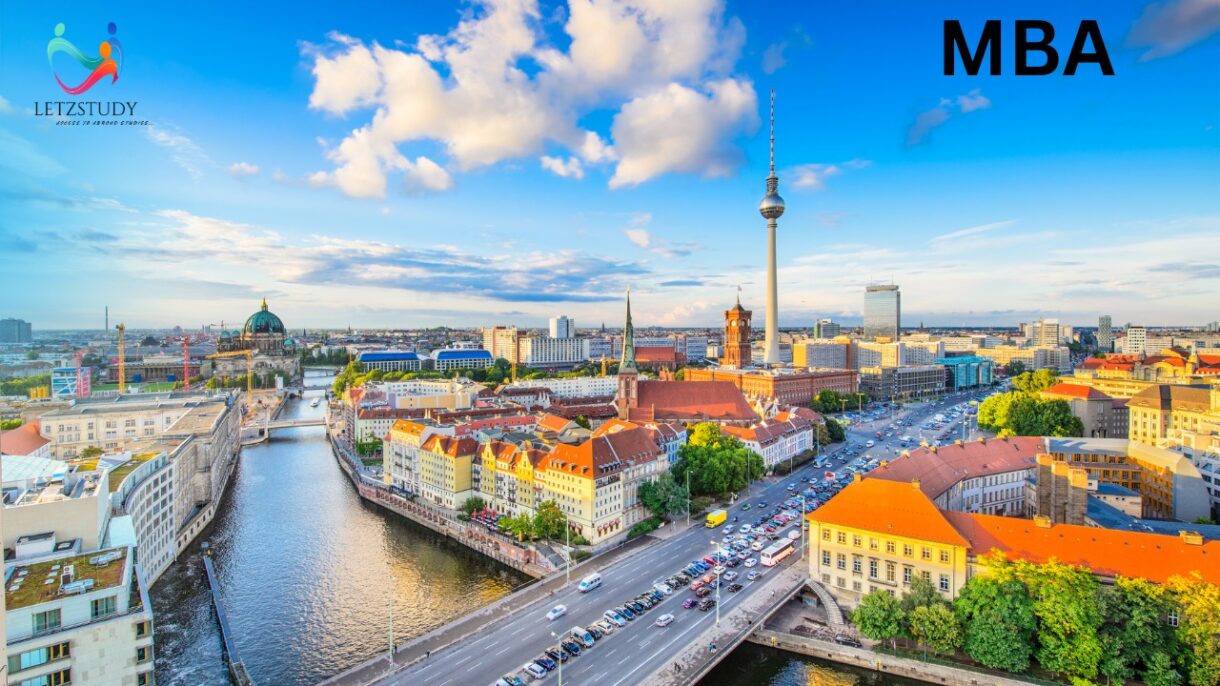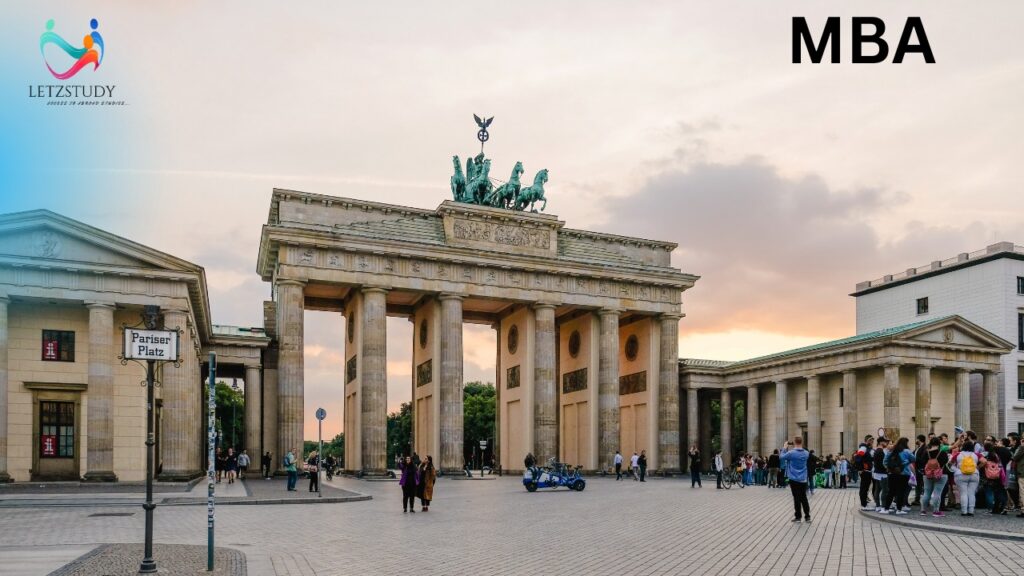
Germany is a popular destination for MBA students. Studying in Germany opens doors to a wide range of career options. If you want to earn an internationally recognized degree or work in Europe’s economic hub, an MBA from Germany could be your right choice.
Why choose Germany as your MBA destination?
1. Affordable Education With High ROI
Germany has MBA programs that are more affordable than those in the US, UK, or Australia. Even private universities offer quality education for competitive prices. Many public institutions have low tuition costs.
2. Universities that are recognized globally
The top business schools in Germany are among the world’s best. The MBA program at ESMT Berlin and Mannheim Business School is rigorous and prepares students for leadership positions.
3. After-study work opportunities and a strong job market
Germany is one of the most powerful economies on the planet. MBA graduates can work in companies like BMW, SAP, and Siemens.
Top MBA Universities in Germany
1. Mannheim Business School
- Germany’s top business school is consistently ranked.
- Full-time MBA, executive MBA, and part-time MBA are available.
- Career services and a strong corporate network.
2. ESMT Berlin
- Leadership and Innovation as the focus.
- Global networking offers.
- After graduation, there is a high rate of employment.
3. Otto Beisheim School of Management
- The program is known for its strong entrepreneurial spirit.
- The highest MBA salary in Germany.
4. Frankfurt School of Finance & Management
- Focus on finance and banking.
- Offers a unique part-time MBA option.
5. HHL Leipzig Graduate School of Management
- The oldest Business School in Germany.
- Entrepreneurship and Leadership are given a high priority.
MBA Programs in Germany
1. MBA Full-Time
- Duration: 1 to 2 years.
- The best for anyone looking to advance their career.
- Includes internships and networking opportunities.
2. MBA Part-Time
- Duration: 2 to 3 years.
- Ideal for professionals.
- Students can continue working and study at the same time.
3. Executive MBA (EMBA)
- Designed for managers and senior executives.
- Focus on leadership and strategic decisions.
4. Online MBA
- Accessible to professionals worldwide.
- Flexible and comfortable working environment.
- Access to global business networks.
MBA Admissions Requirements in Germany
1. Educational Qualifications
- Bachelor’s degree (3-4 years minimum).
- Certain universities may require specific GPAs.
2. Work Experience
- Minimum of 2-5 years.
- Required for some MBAs and executive MBAs.
3. GMAT/GRE Scores
- Some universities may not require GMAT/GRE, but others will.
4. English Proficiency
- Non-natives must take TOEFL or IELTS, preferably both (6.5-7.0).
Cost of MBA Study in Germany
1. Tuition Fees
- Public universities have low or no tuition fees.
- Private universities: EUR 20,000 to EUR 50,000.
2. Cost of Living
- Average: EUR 850 – EUR 1,500 per month.
- Includes accommodation, meals, transportation, and other personal expenses.
3. Scholarships & Financial Aid
- DAAD Scholarships.
- Deutschlandstipendium.
- Scholarships for specific universities.
Job Opportunities After Completing an MBA in Germany
1. The Demand for Skilled Professionals is High
MBAs are in high demand because of the talent shortage in Germany, especially in sectors like finance, management, and technology.
2. Average Salaries
- Starting MBA graduate: EUR 50,000 to EUR 70,000 per annum.
- Experienced professionals: EUR 80,000 to EUR 120,000 per annum.
3. Working Visas and PR Opportunities
- Germany provides an 18-month work permit for graduates.
- After employment, you can apply for permanent residence.
Applying for an MBA Program in Germany
1. Research and Shortlist Universities
Find universities that fit your financial and career budget.
2. Preparation of Application Documents
- Updating CV.
- Transcripts of academic records.
- SOP (Statement of Purpose).
- Letters of Recommendation (LOR).
- GMAT/GRE and English test scores.
3. Apply Online
Many universities offer online applications. Submit applications before deadlines.
4. Get Financial Aid and Scholarships
Find funding to help you with your financial obligations.
5. Student Visa Application
- First, secure admission.
- How to apply for a German Student Visa (Type D visa).
Common Challenges of Pursuing an MBA in Germany
1. Language Barrier
- Problem: Despite many MBA programs being in English, basic German language skills are important for daily life.
- Solution: Use tools like Duolingo or Babbel for practice, and engage with local communities to improve communication.
2. Strict Admissions Requirements
- Problem: German Universities require specific criteria, including GMAT scores and work experience.
- Solution: Research each school’s eligibility criteria and tailor your application. Prepare well for the GMAT/GRE.
3. High Living Costs in Some Cities
- Problem: Cities like Munich and Frankfurt can be expensive.
- Solution: Look for part-time work opportunities, apply for scholarships, or consider living in more affordable cities like Leipzig or Aachen.
4. Strict Visa and Work Permit Regulations
- Problem: Requirements for post-MBA work visas can be complex.
- Solution: Ensure you have a blocked account (USD 11,208 per year) and maintain good academic standing.
5. Limited Networking Opportunities
- Problem: Germany’s MBA ecosystem is still developing compared to the US and UK.
- Solution: Attend alumni events, connect via LinkedIn, and choose universities with strong business networks like Mannheim Business School.
6. Cultural and Academic Differences
- Problem: The independent learning style may be a challenge for some students.
- Solution: Focus on self-learning, time management, and seek help from professors and study groups when necessary.

13 Tips to Successfully Pursue an MBA in Germany
1. Select the Best Business School
Look for accreditation by AACSB, EQUIS, or AMBA. Examples include Mannheim Business School or WHU – Otto Beisheim School of Management.
2. Choose Your MBA Specialization
Germany offers a variety of specializations like Marketing, Finance, Technology Management, and Entrepreneurship.
3. Understand the Admissions Requirements
Ensure you meet the typical requirements, including a Bachelor’s degree, work experience, GMAT/GRE scores (if required), and TOEFL/IELTS.
4. Consider Private Universities
Private universities may have higher tuition but offer better industry contacts and smaller class sizes.
5. Find Out About MBA Costs
Public universities have low tuition, while private universities can cost between EUR 15,000 and EUR 40,000.
6. Explore Scholarship Opportunities
Apply for scholarships like DAAD, Deutschlandstipendium, or ESMT Women’s Scholarships.
7. Compare German and English MBA Programs
Although many MBA programs are in English, knowing basic German at A1 or A2 level will improve job prospects.
8. The GMAT/GRE Test May Be Optional
Some universities waive the GMAT/GRE requirement if you have a strong academic or work background.
9. Prepare Strong SOPs & LORs
Craft a powerful SOP showcasing your leadership goals and career aspirations.
10. Apply for a German Student Visa
Ensure you meet financial requirements and apply for the Type D visa once you’re admitted.
11. Take Advantage of Internships and Job Opportunities
Germany has a large corporate network, offering plenty of opportunities for MBA graduates.
12. Use the Post-Study Work Visa in Germany
Germany offers an 18-month work permit for MBA graduates to stay and find a job.
13. Learn German for Better Job Opportunities
Learning German (B1/B2) and attending career fairs will help improve your chances of securing a job.
The Top MBA Schools in Germany
University of Mannheim, Mannheim Business School
QS World Rankings 2025: #487
Average tuition fees (EUR): 34,000 – 40,000
Frankfurt School of Finance & Management
QS World Rankings 2025: #40
Average tuition fees (EUR): 39,000 – 45,000
Otto Beisheim School of Management
QS World Rankings 2025: #55
Average tuition fees (EUR): 42,000 – 48,000
ESMT Berlin
QS World Rankings 2025: #75
Average tuition fees (EUR): 45,000 – 55,000
HHL Leipzig Graduate School of Management
QS World Rankings 2025: #86
Average tuition fees (EUR): 32,000 – 38,000
Technical University of Munich
QS World Rankings 2025: #28
Average tuition fees (EUR): 25,000 – 35,000
Why Pursue an MBA in Germany?
Affordable Education
Many public universities offer free education, significantly reducing the financial burden when compared with other countries.
A Practical Learning Approach
German MBAs emphasize hands-on skills by focusing on internships, industry collaborations, and case studies.
Student-Friendly Visa Policy
Germany provides student-friendly regulations, with extended residence permits post-graduation to provide ample time to find work after graduating.
Exposure to a Rich Culture
Studying abroad gives an unmatched chance for personal growth and a global perspective.
Statistics Insights
Tuition Fees
The tuition fees vary between EUR 6,350 and EUR 49,500, depending on which institution you are attending.
Salary Increases After an MBA
Graduates often receive significant raises, which can range from EUR 70,000 up to EUR 120,000 per year, depending on the industry.
Case Studies and Practical Learning
Zara’s Adaptive Strategy
Zara is known for its quick-response supply chain and low-marketing-dependence model, which enables the brand to stay ahead of fast-changing consumer demands. A case study on Zara highlights how flexibility and rapid decision-making in production and distribution set them apart in the retail industry.
Starbucks’ Digital Transformation
Starbucks has embraced technology to transform customer engagement and operational efficiency. Their mobile app, which allows customers to order and pay in advance, is an example of digital innovation driving business growth. This transformation is a key example of how technology can reshape the customer experience in the service industry.
Wolfgang Keller’s Leadership Dilemmas
Wolfgang Keller’s leadership experience at the Ukrainian branch of a German beer company provides a deep dive into the complexities of international management. From handling cross-cultural teams to managing performance in a volatile market, Keller’s experience highlights the nuances of leading a global team and navigating diverse business environments.

Real-World Success Stories
1️ Arjun Gowda’s Dream of Studying in the USA 🇺🇸
Challenge: Arjun, a Bangalore-based engineering student, had difficulty selecting the best MS program in the USA. He sought a university that balances academic excellence, affordability, and research opportunities.
Solution: After consulting with LetzStudy, we assessed Arjun’s academic history, career objectives, and budget. Our experts recommended universities with strong STEM programs that offer scholarships and focus on OPT courses.
Outcome: Arjun was admitted to Arizona State University with a partial scholarship. He is now pursuing a Master’s Degree in Data Science and has received internship offers from leading tech companies.
2️ Priya R P’s Journey to the UK 🇬🇧
Challenge: Priya was interested in pursuing an MBA at a UK university but wasn’t sure about the GMAT or which universities to apply to. She also needed advice on work opportunities after graduation.
Solution: LetzStudy assisted her in shortlisting the top business schools that waived the GMAT requirement and provided strong placement support. We also helped her with the application, SOP, and scholarship process.
Outcome: Priya has been accepted to the University of Birmingham to pursue an MBA. She received a 30% tuition waiver and is excited about the career and networking opportunities in the UK.
3️ Rahul Kumar’s Australian MBBS Journey 🇦🇺
Challenge: Rahul wanted to pursue an MBBS at the University of Melbourne but was confused about eligibility requirements, entrance exams, and financial planning.
Solution: LetzStudy provided detailed information about Australia’s leading medical universities and entry requirements. We also guided Rahul in securing scholarships and student loans to fund his education.
Outcome: Rahul has been admitted to Monash University and is now on his way to becoming a doctor!
Influencers in the Field and Experts
Laura Winkler – MBA Student at HHL Leipzig:
Laura Winkler is a storyteller, content strategist, and MBA student at HHL Leipzig. She shares her experiences and challenges during her MBA journey, offering valuable first-hand insight into the life of a business school student.
Why Germany for an MBA?
Pursuing an MBA in Germany offers a unique opportunity to gain quality education, valuable experience, and attractive career prospects within a rich cultural environment.
Ready to Pursue Your Dream MBA?
LetzStudy has helped students like Arjun, Priya, and Rahul achieve their international education goals. Whether you’re looking to study in Germany or another global destination, we offer expert guidance to help you choose the right MBA program and navigate the admissions process smoothly.
Get in Touch with LetzStudy Today
Contact us for personalized consultation and support in achieving your dream MBA or study abroad program. Let us help you make the best choice for your academic and professional future.
Contact Us at:
PH: +919380486921
Visit our website LetzStudy.com to learn more!
For more information, connect with us on LinkedIn, and for daily updates follow us on Instagram
*Universities regularly update their fees, eligibility, and policies. While we aim to keep this content accurate, readers should always check official sources for the latest information.

